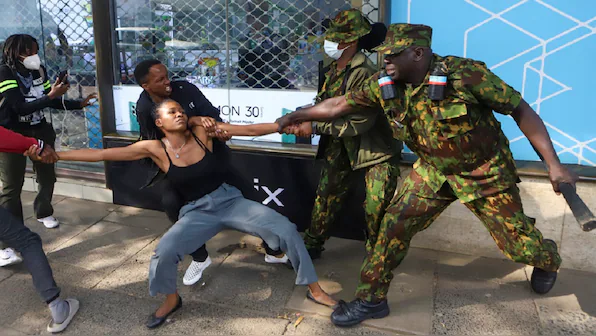
After a full month of effective demonstrations, the Kenyan government through National Police Service has banned nationwide demonstrations, citing threats to national security and infiltration of a genuine cause by criminals. According to a statement signed by interim police boss Douglass Kanja, the law enforcement fraternity has encountered ‘credible intelligence’ that there are plans by criminals to hijack demonstration and loot from other people’s hard work. While the concerns raised are critical, citizens continue to question their logic, given they have the power to neutralize the threats, or better still exercise their constitutional mandate of providing protection to demonstrators.
Kenyan youths had earlier planned to camp at Uhuru park, in a rally akin to the events of January 25, 2011 when Egyptians thirsty for change, defied the pain of bullets, teargas and water cannons. That date marked the beginning of the end to President Hosni Mubarak’s three decade rule. The Arab spring exploded, followed by massive protests in Tunisia, leading to the flight of the then president Zine Al Abidine. Bottom-line is, Mr. Mubarak surrendered to popular demand and left office, later on charged in the International Criminal Court, for his involvement in the deaths of protesters.
Unlike Mubarak, Ruto did not enjoy the luxury of time after ascending to power only 18 or so months ago before Kenyans began to demand for his resignation. Reminiscent of the Tahrir square, agitated Kenyans had earlier vowed to camp at Uhuru Park, Nairobi until the president calls it quits, an ambition that now seems herculean to achieve, having been outlawed by the government. Experts have pointed to his populist rhetoric that established the foundations of his administration on a quicksand. He has since resorted to blaming certain ‘unscrupulous’ foreign NGOs, Ford Foundation included, for funding an unrest in the country.
“Since the public demonstrations by Kenyan youths began in June this year, our country has experienced enormous losses; people have been injured, lives lost, property and businesses destroyed and livelihoods lost,” the statement that was shared on X reads in part. ” Criminals have continued to infiltrate the protesting groups, resulting in a troubling trend of disorderly and destructive conduct,” the statement declared.
It is to be noted that since the demonstrations first broke out, over 40 people have reportedly died, with over 300 reported injuries. A number is reported missing, while abductions and arrests have claimed more than 650 Kenyan youths. “While the constitution under article 37provides for the right, peaceably and unarmed, to assemble, to picket , to demonstrate and to present petitions to public authority, the constitution equally provides for the critical role that the National Police Service plays in the National Security of our country,” the statement reads. “In keeping our constitutional role and in the interest of national security, we wish to inform the public that we have credible intelligence that organized criminal groups are planning to take advantage of the ongoing protests to execute their attacks including looting,” the statement proceeds.
In one of the last picket days, young people on the streets of Nairobi, alongside business owners could be seen armed with batons, in readiness to deter any looters from breaching private or public property. “Acting on this information and in accordance with international security standards for public assemblies, which require a designated leader to coordinate, collaborate and cooperate with police for peaceful demonstrations, the lack of designated leadership in previous demonstrations has made it difficult to enforce safety protocols. As a result, no demonstration would be permitted in the Nairobi Central Business District,” the National Police Service indicates.
This bans also applies to towns and cities within the vicinity of the capital and by extension major cities in the entire country. Despite glaring police brutality and forced arrests, those in situ in the government have praised police officers for ‘conducting themselves professionally’ during the protests.










